|

Summer 2005 (13.2)
Pages
24, 25, 27, 28
Rostropovich (1927-2007) & Galina
Celebrating Their 50th Wedding Anniversary
by
Betty Blair and Sheyla Heydarova
Other articles about
Rostropovich
(1) "Rostropovich:
The Home Museum" by Gulnar Aydamirova. (AI 11.2, Summer
2003)
(2) "Rostropovich:
Happy 75th Birthday. World-Famous Cellist Celebrates in Baku."
(AI 10.1, Spring 2002)
(3) "Intellectual
Responsibility. When Silence is Not Golden." Conversations
with Mstislav Rostropovich and Galina Vishnevskaya by Claude
Samuel. (AI 13.2, Summer 2005)
(5) "Famous
People: Then and Now. Mstislav Rostropovich - Cellist and
Conductor (1927-2007)." (AI 7.4, Winter1999)
(6) "Rostropovich
Celebrates 70th Jubilee in Baku." (AI 5.2, Summer 1997)
(7) "Philharmonic Reopens: Renovation
of Baku's Prestigious Concert Hall," by Abid Sharifov,
Deputy Prime Minister. (AI 12.2, Summer 2004).
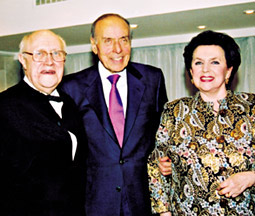  Left: The late President
Heydar Aliyev with Cellist Mstislav Rostropovich and his wife
opera singer Galina Vishnevskaya. Rostropovich was born in Baku
in 1927. Aliyev invited Rostropovich to make Baku a regular place
to visit, beginning in 1997 when Rostropovich's 70th Jubilee
was celebrated on the national level. Since then, Rostropovich
has returned nearly every year to give concerts and Master classes. Left: The late President
Heydar Aliyev with Cellist Mstislav Rostropovich and his wife
opera singer Galina Vishnevskaya. Rostropovich was born in Baku
in 1927. Aliyev invited Rostropovich to make Baku a regular place
to visit, beginning in 1997 when Rostropovich's 70th Jubilee
was celebrated on the national level. Since then, Rostropovich
has returned nearly every year to give concerts and Master classes.
The
setting: May 1955. Prague. Exotic city of beauty and personal
warmth. City with historical roots based in music. He was 28.
She was 29.
He was there to play his cello and as a member of an international
jury. She was there for the Prague Spring Festival to perform
the leading role of Tatiana in Tchaikovsky's opera Eugene Onegin.
It was her first time outside of the Soviet Union. He had been
out before.
They had made a brief acquaintance with each other a few weeks
earlier in Moscow at a government reception.
But then there was Prague. "And then we went for a walk
in the park", he recalls. A whirlwind romance followed.
Actually, "tornado" might be a better word for it.
Four days later, they were married.
She describes it this way: "The first day, I went to my
closet at the hotel and found my clothes completely covered with
lilies. The following day, I found orchids in all four corners
of the room. The third day, the floor was strewn with boxes of
chocolates. That was the day I was supposed to leave to return
to Moscow. And though he had other engagements, without a moment's
hesitation, he canceled them and followed me. On the fourth day,
we were married."
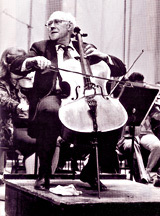  Left:
Mstislav
Rostropovich. Left:
Mstislav
Rostropovich.
It was such
an intense relationship. "I was waiting for a love worth
dying for - just like the heroines in the operas that I was performing.
We were rushing off to each other and no power could stop us,"
she says.
And thus, began a new life together of a rising star of Moscow's
Bolshoi opera and a musician who would become world-renowned
cellist and symphony conductor.
They kept their own professional names. Hers, Galina Vishnevskaya.
His Mstislav Rostropovich. "I had already made a name for
myself at the Bolshoi Opera and abroad," she said, explaining
why she had not become "Mrs. Rostropovich".
And with a humorous touch, she added, "Since I was more
famous than he was, someone suggested that Rostropovich take
my name Vishnevskaya while we were registering our marriage.
He refused much to their surprise. In the end, we both kept our
own names."
Curiously, despite the fact that both of them were already recognized
musicians, they had never heard each other perform. That would
come six months later. Hearing each other in concert was not
the determining factor in their decision to marry since they
realized that it was music and performance that had shaped their
personalities. "Art plays an enormous role in the formation
of a human being," observes Rostropovich. One might wonder
if such headiness and passion would last the test of time. But
here it is half a century later and one of the world's most well
known musical couples just celebrated their 50th Wedding Anniversary
on May 15th, 2005.
50th Wedding Anniversary
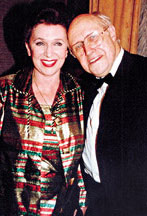  Left:
Galina Vishnevskaya
and Mstislav Rostropovich celebrated their 50th wedding anniversary
in May 2005. Courtesy: Rostropovich Home Museum in Baku. Left:
Galina Vishnevskaya
and Mstislav Rostropovich celebrated their 50th wedding anniversary
in May 2005. Courtesy: Rostropovich Home Museum in Baku.
Actual celebrations
took place in Paris (where the couple lives) and Moscow (where
they were living when they were stripped of their citizenship
for befriending the dissident writer Solshenitzyn in the 1970s).
But Baku feels a close affinity to Rostropovich as well because
he was born there. Baku is the city that boasts a Home Museum
dedicated to Mstislav Rostropovich and his father Leopold who,
according to Mstislav was an "absolutely phenomenal cellist
and excellent pianist who was an extraordinary sight reader and
played everything by heart". Their two-story home is on
the street, which today bears the names of both father and son.
Born in Baku in 1927, Slava (as his friends call him, and whose
name means "glory") and his family moved to Moscow
in 1931. They had come to Baku (as many superb musicians had)
upon the invitation of Uzeyir Hajibeyov
(1885-1948)
a few years earlier to assist in the effort to establish a strong
music education program in Azerbaijan.
Rostropovich has not forgotten his place of birth. Since 1997,
on the occasion of his 70th birthday, he has been making trips
back to Baku nearly every year, not only to perform, but also
to conduct a weeklong schedule of Master Classes to inspire young
musicians. That's when the auditorium of the Music Academy fills
with about 250 observers - students, teachers and parents - all
keen to watch and listen while a few of the most promising students
from Baku's prestigious music schools are invited to perform
under the watchful eye and discerning ear of one of the world's
leading musicians. Baku feels extremely indebted to the Maestro
for all this attention and generosity.
As a Couple
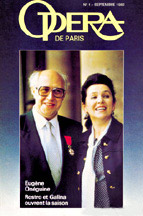  Of course, when two
headstrong musicians live together, there are bound to be tensions.
The question is how well they can learn to cope and compromise. Of course, when two
headstrong musicians live together, there are bound to be tensions.
The question is how well they can learn to cope and compromise.
Surprisingly, one of the first run-ins came when Slava wanted
to accompany Galina as her pianist at concerts. She had her own
pianist and didn't take to the idea lightly.
"What are you saying?" she demanded. "YOU want
to accompany me? Why, you're crazy, you don't know how to play
the piano. I thought you were a cellist!"
Slava assured her that he did know how to play. "I'll work
at it every day, I promise you." It was Slava's way of creating
a situation so he could spend more time with her. And thus he
did become her pianist.
But they both admit to quarrels sometimes so intense that they
couldn't finish practicing together. "The next day,"
Galina admits, "we would be so angry with one another that
we would go to the concert hall without speaking to one another,
promising ourselves that we would never perform together again.
But then, on stage we would merge into an indissoluble whole,
taken to a distance beyond the clouds...Suddenly we would start
to talk to each other with the language of music."
Slava adds: "You know, outwardly, people often completely
misjudge what takes place between a couple. It's for this reason
that I no longer give the least bit of credence to rumors that
circulate about other couples."
It should not come as a surprise that music fulfills them in
different ways. For her, music is satisfying when she can share
it with others. For him, just experiencing the emotion and passion
of music is sufficient.
As personalities, they have different needs as well: "By
nature, I've always been very independent," admits Galina.
"Even when I was at the Bolshoi and was part of that enormous
company, I was still basically alone. I would go to rehearsal,
perform and then go straight home."
Slava was the opposite. Galina describes him as having a deep
need to socialize and be with colleagues. "He likes to be
part of a group. That's why he likes working so much with symphonic
groups," she notes.
But she insists this is what makes life interesting. "All
these differences provide balance. If I had a husband who was
as independent as I am, I wonder how our lives might have turned
out. Or if Slava had married a woman as sociable as he, I'm sure
they both would have gone crazy."
It seems they have long given up on changing each other. "It's
totally useless," Galina admits. "When I met him, I
had a lot of trouble accepting his lifestyle. His sociability
and all his new acquaintances used to exasperate me; I couldn't
stand it and I tried to stop him. Later I understood that this
whirlwind existence was necessary for him. When he's by himself,
he's lost. So, I've decided not to meddle with his lifestyle."
The Family
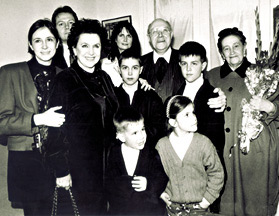  Left:
Mstislav
Rostropovich with his family at the Rostropovich Home Museum
in 1997 in Baku. Rostropovich lived in this house until he was
four years old when his family moved to Moscow. Left to right:
Front row: grandchildren (Elena's children). 2nd row: Daughter
Elena, wife Galina Vishnevskaya. The elder woman with flowers
is Rostropovich's sister who also lived in this home in Baku.
Back row: Olga's husband Olaf Geran-Germess, daughter Olga, Mstislav
Rostropovich. Left:
Mstislav
Rostropovich with his family at the Rostropovich Home Museum
in 1997 in Baku. Rostropovich lived in this house until he was
four years old when his family moved to Moscow. Left to right:
Front row: grandchildren (Elena's children). 2nd row: Daughter
Elena, wife Galina Vishnevskaya. The elder woman with flowers
is Rostropovich's sister who also lived in this home in Baku.
Back row: Olga's husband Olaf Geran-Germess, daughter Olga, Mstislav
Rostropovich.
Their family
has grown up now. They have two daughters and six grandchildren.
The daughters have followed in the path of their parents and
have become distinguished musicians. The older one Olga plays
the cello and instructs.
She is married to French businessman Olaf Geran-Germess. They
have two sons - Oleg and Mstislav. The younger daughter Elena
is a pianist and General Director of the International Music
Festival in Evian (France). She married the Italian publisher
Stefano Tartini. They have four children - Ivan, Sergey, Anastasia
and Alexander.
The entire family has been to Baku to visit the city and see
Slava's home, which now has been converted into a monument to
his memory.
In 1991, the couple established a charitable fund known as the
Vishnevskaya-Rostropovich Fund. Its original goal was to provide
health immunization for children in Russia. In 2002, a branch
of the foundation was opened in Baku.
The nationwide children's vaccination program was carried out
between June 2003 and May 2004, to protect Azerbaijani children
against measles, mumps, and rubella (MMR) - 750,000 children.
________________________________________________________________________________
 This
article was based on discussions in the book: "Mstislav
Rostropovich and Galina Vishnevskaya:Russia, Music and Liberty.
Conversations with Claude Samuel. Translated by E. Thomas Glosow.
Amadeus Press: Portland, Oregon, 1995. Available on the Internet.
Highly recommended. This
article was based on discussions in the book: "Mstislav
Rostropovich and Galina Vishnevskaya:Russia, Music and Liberty.
Conversations with Claude Samuel. Translated by E. Thomas Glosow.
Amadeus Press: Portland, Oregon, 1995. Available on the Internet.
Highly recommended.
Aytan Aliyeva
also contributed to this article.
Back to Index
AI 13.2 (Summer 2005)
AI Home
| Search | Magazine
Choice
| Topics
| AI Store | Contact us
Other Web sites
created by Azerbaijan International
AZgallery.org | AZERI.org | HAJIBEYOV.com
|






 This
article was based on discussions in the book: "Mstislav
Rostropovich and Galina Vishnevskaya:Russia, Music and Liberty.
Conversations with Claude Samuel. Translated by E. Thomas Glosow.
Amadeus Press: Portland, Oregon, 1995. Available on the Internet.
Highly recommended.
This
article was based on discussions in the book: "Mstislav
Rostropovich and Galina Vishnevskaya:Russia, Music and Liberty.
Conversations with Claude Samuel. Translated by E. Thomas Glosow.
Amadeus Press: Portland, Oregon, 1995. Available on the Internet.
Highly recommended.